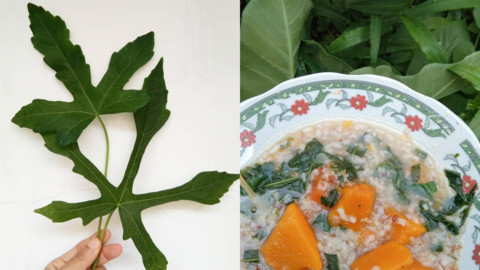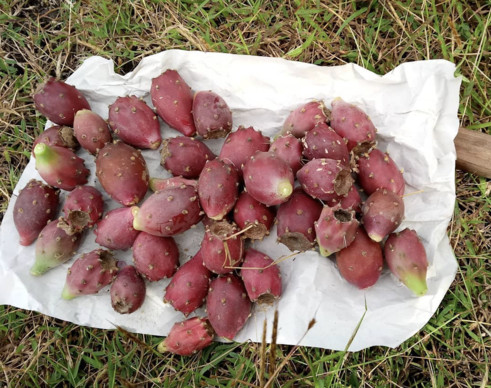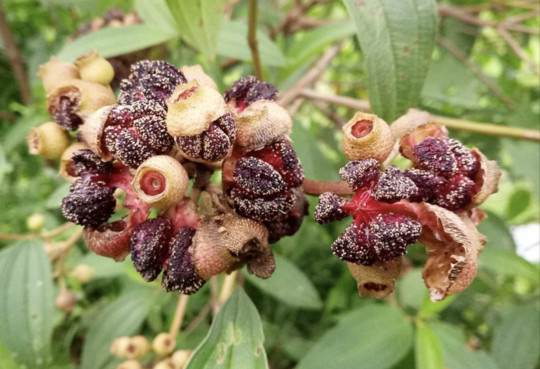Popular Reads
Top Results
Can't find what you're looking for?
View all search resultsPopular Reads
Top Results
Can't find what you're looking for?
View all search resultsGoing wild: Urban Indonesians go back to nature in search for food
Change text size
Gift Premium Articles
to Anyone
 Plant to plate: Gedi leaves are turned into Manadonese porridge (rice congee with vegetables) by Dyah Kartikasari. Just like okra, Gedi leaves have an emulsifying property to thicken the texture of a soup. (Personal collection/Courtesy of Dyah Kartikasari) (Personal collection/Courtesy of Dyah Kartikasari)
Plant to plate: Gedi leaves are turned into Manadonese porridge (rice congee with vegetables) by Dyah Kartikasari. Just like okra, Gedi leaves have an emulsifying property to thicken the texture of a soup. (Personal collection/Courtesy of Dyah Kartikasari) (Personal collection/Courtesy of Dyah Kartikasari)
A growing group of foragers in Indonesia is discovering new joys in the mindful pursuit of finding food in the wild.
It was just a typical morning in the life of Dyah Kartikasari, 45. She paid her regular visit to a greengrocer nearby in her native Malang, East Java, but then her eyes came across an unknown type of wild plant the sellers had on display. Like most Indonesians, Dyah's plate had always been filled with food made from cultivated crops usually available in the market, so the thought of eating wild plants startled her a little. Yet the experience unveiled a world she would soon be keen to explore: gathering, identifying and utilizing wild food resources or known as foraging.
Nature has always provided bountiful supplies to help humans thrive beyond what is displayed in supermarket aisles. Foraging was a way to sustain life but it has petered out. Today, the practice is being reintroduced by urban foragers documenting their hunts on social media.
Like Dyah, 27-year-old Indah Kumala is drawn to foraging as it helps her see nature in a better light.
"The more I discover edible wild plants, the more I realize how little I know of this Earth I'm living on. Other than that, foraging helps me learn about Indonesia's biodiversity — and a sense of wonder and pride grows within me," said Indah, a content writer who resides in Probolinggo, East Java.
Both Dyah and Indah run a social media account filled with foraging adventures. The hunt for food is not just a simple pastime for them; rather, it’s a way of life. They have been incorporating their findings into home-cooked meals and drinks for the family.
The effect is noticeable on the body, according to Indah.
"After consuming wild mushrooms more often, I am less likely to get sick," she said.
Wild mushrooms are packed with anti-inflammatory properties. She added that herbal tea made out of edible flowers helped relax her mind.
Starting point
Humans only utilize a tiny fraction of the existing edible plants in the world, or only about 4 percent of between 250,000 to 300,000 species, according to the United Nations Food and Agriculture Organization (FAO). Despite the vast number of edible plants we are missing out on, it takes more than curiosity to start foraging. Going out and about in the wild to pursue food resources requires knowledge and preparation.
Indah always uses image recognition technology Google Lens to identify a plant and whether it is safe to pick and eat it.
Indah, who goes by @kumkumy08 on Instagram, always brings along gloves, scissors, a knife and a container to store her findings.
"[I bring them] not only for meals and drinks, but you can also forage your way to have fresh and cut flowers to liven up your home."
In the city
Foraging sounds like a rural-only activity that is off the table for those who live in the capital, like Jakarta. Ristiya Dwi Anggraeni, confirms foraging's viability in a congested, urban setting, which she did while she was still residing in Central Jakarta.
"If you live in Jakarta and you are keen to start foraging, Jakarta's urban forests can be your go-to [locations]. Some apartment buildings [in Jakarta] I know are also planted with edible plants. I even found some rare fruit trees in Gelora Bung Karno [GBK] stadium," said Ristiya, a housewife with a fondness for gardening.
Blue berries: Foraged blue tongue berries found by Indah Kumala in East Java's mountainous area. (Personal collection/Courtesy of Indah Kumala) (Personal collection/Courtesy of Indah Kumala)Ristiya said she never experienced legal hurdles or constraints when foraging. She often finds rare edible fruits in GBK strewn on the ground.
"If we are willing to explore and really look, Jakarta has some green public spaces that make foraging possible."
However, foraging in the city calls for extra caution due to higher exposure to contaminants like vehicular pollutants and wild animal droppings.
Timely yet timeless
During the pandemic, foraging took on a new meaning. As the virus outbreak inspires people to appreciate the outdoors more, foraging allows them to deepen their connection to the city they are residing in, letting them have a taste of their city, quite literally.
For urban foragers, it is also a means to relive older practices that foster social interactions rarely nurtured in the city. It was through the exchanged stories between neighbors that introduced Dyah to foraging.
"As we feel like we have taken what nature has offered, we feel the need to pass the goodness to others, and I feel like that's the most fulfilling part of foraging," Dyah said.
The Jakarta Post advises readers to gather as much information about foraging through research, literature or classes before getting started.












